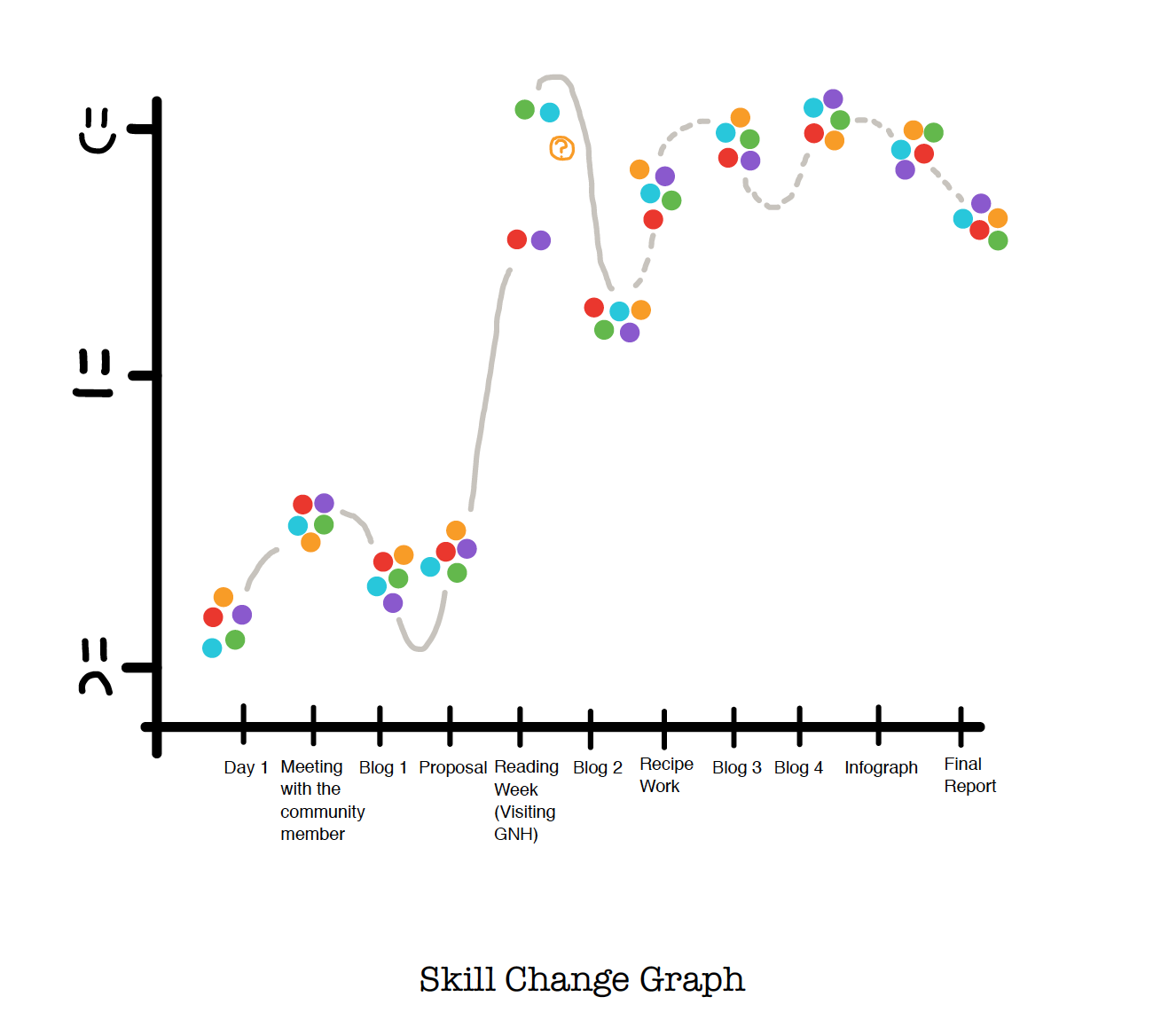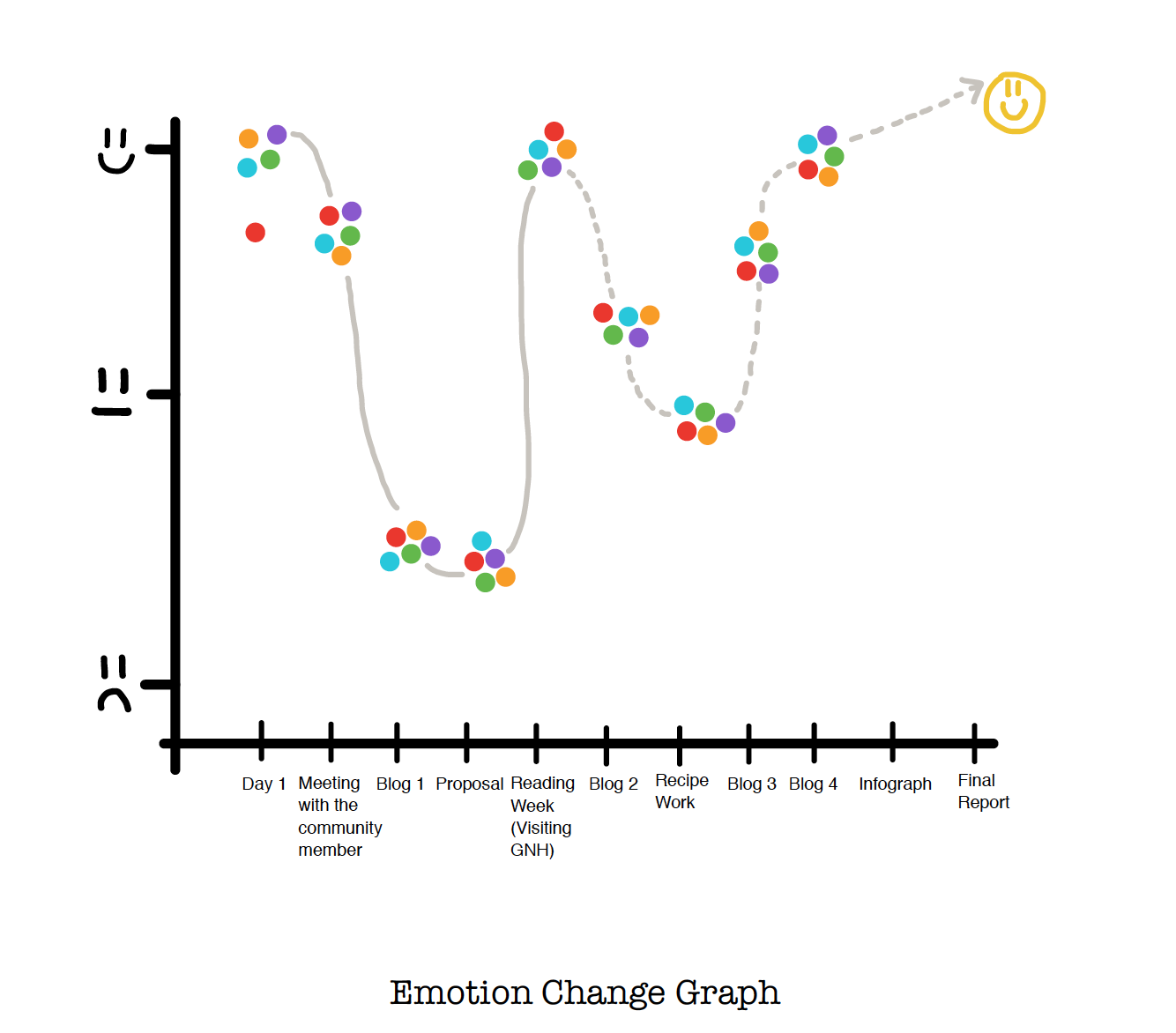“Everyone is invited to lunch at Gordon Neighbourhood House”
– Gordon Neighbourhood House
Welcome back! We have got a great post ahead, about our most significant change. To find out about our progress, keep on reading.
Since our last blog post, we have changed our focus from gathering information and planning our project, to implementing the steps we have outlined in our proposal. We have started developing and testing vegan recipes that we can scale up for GNH, ensuring that they are within the budget and have the necessary nutrients to satisfy the daily requirements of the community members. When testing some of the recipes that were retrieved from online sources, we found that the serving sizes, spices and some of the ingredients needed to be adjusted. Initially, we thought we could directly multiply the ingredients to serve our target number of guests, but soon realized that the flavour of the spices increased exponentially, and that we would need to adjust accordingly. Through testing the recipes, we can ensure that they are suitable for GNH. This includes falling within the budget, taking into account the availability of food resources and the flavour, as well as the appearance of the food. To see what we have in store for the rest of the term and our plans for completing our project successfully, keep on reading!
Weekly Objectives
Below we have outlined weekly objectives that we have established, to complete our project on time and successfully:
March 19: We hope by this date we have finished scaling up the recipes we have tested, as well as the ones Katelyn has provided. At this time we would like to start preparing for the presentation, by working on our infographic and practicing our presentation.
March 26: The final presentation of our project.
April 2: By this date, we hope that we have started and will continue to work on our final report.
April 8: Finish and submit our final report and project.
Achievements
- Met up as a group to find and develop vegan recipes to test.
- Tested the three vegan recipes we selected.
- Started scaling up the recipes Katelyn has provided, taking into account that when scaling up spices you cannot just multiply by the factor you are increasing the recipe by. Instead you must adjust the spices so that they are not too strong.
 Figure 1. Testing the Celery Black Pepper Tofu recipe
Figure 1. Testing the Celery Black Pepper Tofu recipe
Figure 2. Testing the Mexican Bean Rice recipe
Moments of Significant Change
Figure 3. A graph displaying our group’s emotions culminating the past 8 weeks, and a glimpse at what we aspire to achieve in the coming weeks for a successful project completion.
 Figure 4. A graph displaying our group’s skills culminating the past 8 weeks, and a glimpse at what we aspire to achieve in the coming weeks for a successful project completion.
Figure 4. A graph displaying our group’s skills culminating the past 8 weeks, and a glimpse at what we aspire to achieve in the coming weeks for a successful project completion.
What
Our group’s moment of significant change workshop was an important checkpoint to touch base with each other, and see how we are feeling both individually and as a group about the trajectory of our project. As we discussed the project, many of our highs and lows collected around the same areas. We all shared some frustration regarding our first blogs and project proposal report, but expressed similar hope and plans to succeed as the project comes to a close. Our high point as a group was certainly the visit to GNH to prepare and serve a community lunch, which provided both context and personal connection to the project. This made us more excited about the work we are doing, and gave us a better idea of what our newly created recipes will look like as a part of GNH’s lunch service. When attending GNH to serve the lunch, some of us thought that most of the participants would be of low income or less privileged. This thought was soon banished, as we noticed that the majority of the participants did not appear to be of low income. This provided us with another moment of significance, as we experienced a shift in our perspective of GNH and community lunches in general.
In our graph, each differently colored dot represents a member of our group, and the dotted line represents future project milestones.
So What
Completing the moment of significant change workshop was important for our group, as we were able to check in on each other, and realize that we all have similar feelings. It created a sense of comfort in our group and brought us closer together, so that we can work towards our ultimate goal, of finishing the project successfully. It was also a nice opportunity for us to see how far we have come in developing our skills, and how much more work we need to put into this project to continue to grow those skills.
Our main source of stress and uncertainty seems to stem mostly from feeling uninformed, confused, or in the dark about project guidelines, goals and expected outcomes. We often complete assignments feeling like they adhere to the rubrics and guidelines described, but have been disappointed with the grades we received. It is through these certain amounts of anxiety and uncertainty that learning occurs (Shulman, 2005). We are able to develop the necessary skills we need to confidently rise to the challenges we may face as a professional (Shulman, 2005). Furthermore, failures are significant for tacit cooperation of our group as a whole. This allows us to refine our skills and adjust our approach, so that we grow as individuals and as a group. For the remainder of assignments that will be turned in, we as a group will look at our work through our sharpened lens of what is expected, and hope to receive improved grades as a result.
In addition to feeling disappointed with assignment outcomes, these feelings may represent what a community feels when asset based community development (ABCD) is not used. The community members may feel confused or uninformed if ‘professionals’ feel as though they are benefiting the community by implementing interventions that professionals see fit, but in actuality they do not take the community into consideration. We can draw on these feelings to recall thatas we do not want to marginalize the poor and underprivileged, but instead develop the assets of the disadvantaged (Mathie & Cunningham, 2010). One challenge we may face when using ABCD at GNH, is forming dependency (Mathie & Cunningham, 2010). While developing the recipes we have made a point of trying to incorporate ingredients that will be grown in the GNH gardens and ingredients that they receive from the food bank. This way, we are using one of GNH’s many assets, so that they can continue to use the recipes that we provide and don’t create dependency. However, we have been scaling up the recipes without GNH’s assistance and without showing them how it is done. This means that once the project is complete, GNH may not know how to scale up future recipes, which means they depend on others to do this task. We hope that by providing detailed steps in our final report, and by providing the report to GNH, they will be able to use the skills we have outlined, to assist them in scaling up future recipes and not have to depend on others to complete this task.
Now What
Our strategy for successful project completion is to continue to honor the feedback we receive and apply it to our future actions within the project, as well as use the positive energy felt from the GNH visit to power our way through the completion of our project. As we test and scale up our recipes, we will need to pay attention to the spices used, as we have learned from other courses that the strength of spices increase exponentially, if directly multiplied to the needed serving.
On top of that, by keeping our pace strictly in accordance with the weekly objectives, we can ensure that we will finish our project in a timely and effective manner. We have not come across any conflicts within our group, and are hoping to continue the work ethic that we have established, to the end of the project.
Closing remarks
In the course of sharing our emotions, knowledge and change in skills, we realized that as a group, we shared lots of similar emotional changes, and gained skills and knowledge through working together as a group on the project. This encourages us to put more effort into the project, with the hope that we can all feel accomplished at the end. This project provides us with a great opportunity to learn more hands-on skills for preparing food and scaling up recipes.
References
Mathie, A., & Cunningham, G. (2010). From clients to citizens: Asset-based Community Development as a strategy for community-driven development. Development in Practice, 13(5), 474–486. Retrieved on March 24, 2018 from https://www-tandfonline-com.ezproxy.library.ubc.ca/doi/pdf/10.1080/0961452032000125857?needAccess=true
Shulman, L. S. (2005). Pedagogies of uncertainty. Liberal Education, 91 (2), 18-25. Retrieved from http://files.eric.ed.gov/fulltext/EJ697350.pdf

